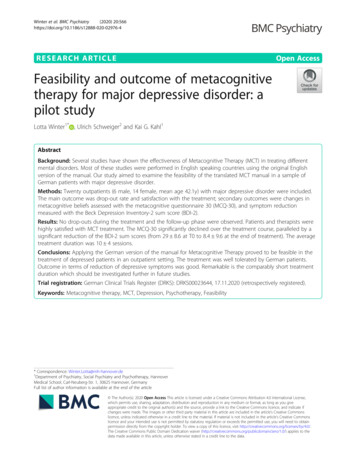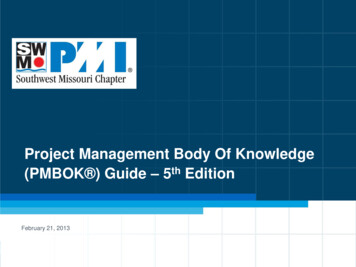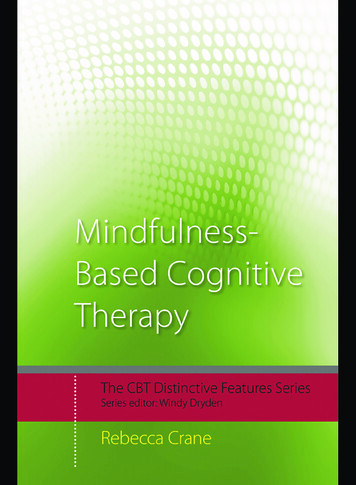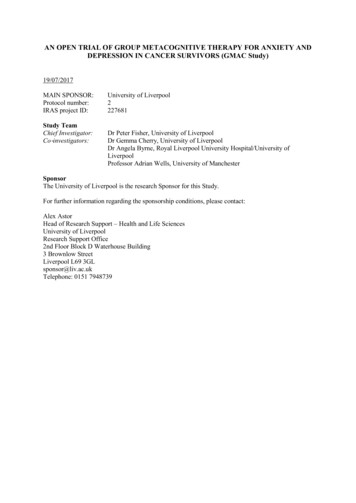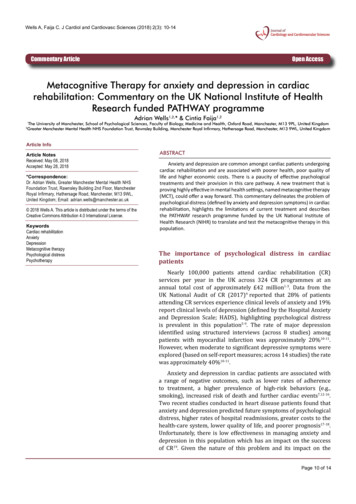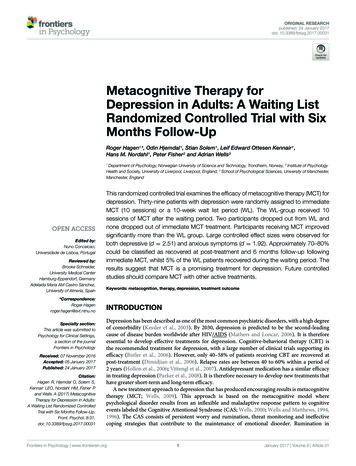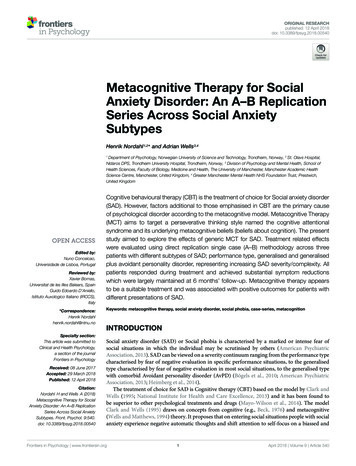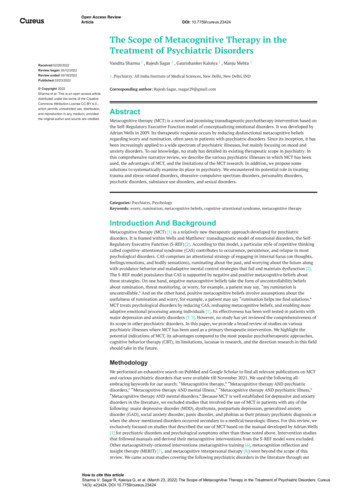
Transcription
Open Access ReviewArticleDOI: 10.7759/cureus.23424The Scope of Metacognitive Therapy in theTreatment of Psychiatric DisordersVandita Sharma 1 , Rajesh Sagar 1 , Gaurishanker Kaloiya 1 , Manju Mehta 1Received 02/26/2022Review began 03/12/20221. Psychiatry, All India Institute of Medical Sciences, New Delhi, New Delhi, INDReview ended 03/18/2022Published 03/23/2022Corresponding author: Rajesh Sagar, rsagar29@gmail.com Copyright 2022Sharma et al. This is an open access articledistributed under the terms of the CreativeCommons Attribution License CC-BY 4.0.,which permits unrestricted use, distribution,and reproduction in any medium, providedthe original author and source are credited.AbstractMetacognitive therapy (MCT) is a novel and promising transdiagnostic psychotherapy intervention based onthe Self-Regulatory Executive Function model of conceptualizing emotional disorders. It was developed byAdrian Wells in 2009. Its therapeutic response occurs by reducing dysfunctional metacognitive beliefsregarding worry and rumination, often seen in patients with psychiatric disorders. Since its inception, it hasbeen increasingly applied to a wide spectrum of psychiatric illnesses, but mainly focusing on mood andanxiety disorders. To our knowledge, no study has detailed its existing therapeutic scope in psychiatry. Inthis comprehensive narrative review, we describe the various psychiatric illnesses in which MCT has beenused, the advantages of MCT, and the limitations of the MCT research. In addition, we propose somesolutions to systematically examine its place in psychiatry. We encountered its potential role in treatingtrauma and stress-related disorders, obsessive-compulsive spectrum disorders, personality disorders,psychotic disorders, substance use disorders, and sexual disorders.Categories: Psychiatry, PsychologyKeywords: worry, rumination, metacognitive beliefs, cognitive-attentional syndrome, metacognitive therapyIntroduction And BackgroundMetacognitive therapy (MCT) [1] is a relatively new therapeutic approach developed for psychiatricdisorders. It is framed within Wells and Matthews’ transdiagnostic model of emotional disorders, the SelfRegulatory Executive Function (S-REF) [2]. According to this model, a particular style of repetitive thinkingcalled cognitive-attentional syndrome (CAS) contributes to occurrence, persistence, and relapse in mostpsychological disorders. CAS comprises an attentional strategy of engaging in internal focus (on thoughts,feelings/emotions, and bodily sensations), ruminating about the past, and worrying about the future alongwith avoidance behavior and maladaptive mental control strategies that fail and maintain dysfunction [2].The S-REF model postulates that CAS is supported by negative and positive metacognitive beliefs aboutthese strategies. On one hand, negative metacognitive beliefs take the form of uncontrollability beliefsabout rumination, threat monitoring, or worry, for example, a patient may say, “my rumination isuncontrollable.” And on the other hand, positive metacognitive beliefs involve assumptions about theusefulness of rumination and worry, for example, a patient may say “rumination helps me find solutions.”MCT treats psychological disorders by reducing CAS, reshaping metacognitive beliefs, and enabling moreadaptive emotional processing among individuals [1]. Its effectiveness has been well tested in patients withmajor depression and anxiety disorders [3-5]. However, no study has yet reviewed the comprehensiveness ofits scope in other psychiatric disorders. In this paper, we provide a broad review of studies on variouspsychiatric illnesses where MCT has been used as a primary therapeutic intervention. We highlight thepotential indications of MCT, its advantages compared to the most popular psychotherapeutic approaches,cognitive behavior therapy (CBT), its limitations, lacunae in research, and the direction research in this fieldshould take in the future.MethodologyWe performed an exhaustive search on PubMed and Google Scholar to find all relevant publications on MCTand various psychiatric disorders that were available till November 2021. We used the following allembracing keywords for our search: “Metacognitive therapy,” “Metacognitive therapy AND psychiatricdisorders,” “Metacognitive therapy AND mental illness,” “Metacognitive therapy AND psychiatric illness,”“Metacognitive therapy AND mental disorders.” Because MCT is well established for depressive and anxietydisorders in the literature, we excluded studies that involved the use of MCT in patients with any of thefollowing: major depressive disorder (MDD), dysthymia, postpartum depression, generalized anxietydisorder (GAD), social anxiety disorder, panic disorder, and phobias as their primary psychiatric diagnosis orwhen the above-mentioned disorders occurred secondary to a medical/neurologic illness. For this review, weexclusively focused on studies that described the use of MCT based on the manual developed by Adrian Wells[1] for psychiatric disorders and psychological symptoms other than those noted above. Intervention studiesthat followed manuals and derived their metacognitive interventions from the S-REF model were excluded.Other metacognitively-oriented interventions (metacognitive training [6], metacognition reflection andinsight therapy (MERIT) [7], and metacognitive interpersonal therapy [8]) were beyond the scope of thisreview. We came across studies covering the following psychiatric disorders in the literature through ourHow to cite this articleSharma V, Sagar R, Kaloiya G, et al. (March 23, 2022) The Scope of Metacognitive Therapy in the Treatment of Psychiatric Disorders. Cureus14(3): e23424. DOI 10.7759/cureus.23424
extensive search: adjustment disorder, prolonged grief disorder, posttraumatic stress disorder (PTSD),obsessive-compulsive disorder (OCD), illness anxiety disorder, body dysmorphic disorder (BDD), bingeeating disorder, bipolar disorder, psychosis, sexual disorders, alcohol use disorder, and borderlinepersonality disorder. We also found a few studies in which MCT was used to manage stress and includedthem in this review, appreciating that stress itself can have numerous negative health consequences. Amongstudies that we encountered, we included only those that had adult (age 18 years) participants. Studies thatused only one or some components of the MCT as an intervention or those which used MCT in conjunctionwith other psychotherapeutic modalities were excluded to highlight the impact of the complete MCT manual(whether administered in a group or an individualized setting) on a given psychiatric disorder. Due to thepaucity of research in this domain and for thoroughness, we included case reports, case series, trials (openlabel, case-control studies, and randomized controlled trials (RCTs)) in this review. However, we did notinclude abstracts, conference proceedings, theses, and dissertations. We also did not include studiespublished in non-English languages.ReviewRole of the metacognitive therapy in various psychiatric disordersAdjustment Disorder Secondary to a Physical IllnessAdjustment disorder is common among patients with potentially life-threatening illnesses [9]. According tothe Diagnostic and Statistical Manual of Mental Disorders, Fifth Edition (DSM-5), some of the corecharacteristics of adjustment disorder include preoccupation with the stressor in the form of excessiverumination, worry, and recurrent distressing thoughts. Psychological interventions targeting these thoughtprocesses may lead to significant positive outcomes [10]. In a single case study, MCT was found to be helpfulin managing symptoms of depression and anxiety in a young woman diagnosed with severe adjustmentdisorder secondary to pulmonary arterial hypertension [11]. MCT was delivered in an inpatient setting everyweek for four weeks. At treatment completion, significant reductions in the negative and positivemetacognitive beliefs, maladaptive coping strategies, along with improvements in anxiety and depressivesymptoms were seen. Because the quality of evidence for psychotherapeutic interventions in adjustmentdisorder is low, in the future, systematic studies of MCT in managing adjustment disorder will shed morelight on the efficacy of this modality.Prolonged Grief DisorderPGD is a new diagnostic entity with limited evidence regarding the effectiveness of pharmacological andnon-pharmacological interventions [12,13]. It is associated with difficulties in coping with loss,preoccupation with thoughts of the deceased, worry over uncertainty and lack of control over future events,intense distress, high level of self-neglect, avoidance of reminders of loss, and substance use. Itssymptomatology is distinct from mood and anxiety disorders and is independently correlated with asignificant risk of morbidity and death, suggesting a need to modify the psychotherapeutic strategy tospecifically target the underlying psychopathology [12,14]. Because ruminating about the loss and worryingabout the uncertainty related to future events are characteristics of PGD, MCT may serve as a promisingtreatment. The efficacy and feasibility of group MCT for PGD were examined in a pilot study using arandomized waitlist control group design [15]. It was provided in six weekly sessions of two hours each.Twenty-two bereaving adults (MCT 12, waitlist controls 10) participated in the study. At postintervention, in the MCT group, significant improvement was seen in PGD symptomatology, anxiety,depression, stress, rumination, and quality of life, with large effect sizes. Further improvement wasobserved at the six-month follow-up. This study provided preliminary evidence in support of brief groupMCT for PGD, highlighting the need for larger RCTs and comparison studies of MCT for PGD with otherpsychotherapeutic modalities.Posttraumatic Stress DisorderMetacognitive processes such as persistent negative thinking and the use of avoidance coping strategiespredict symptoms of PTSD among patients following a traumatic event [16]. The metacognitive model ofPTSD [17] proposes that worry and rumination following a traumatic event, threat monitoring, negativemetacognitive beliefs about the meanings of symptoms, and avoidance coping styles lock an individual inthe experience of trauma and disrupt adaptive processing. One of the first studies on the treatment of PTSDusing MCT was performed by Wells and Sembi [18] using a case series design (N 6). A longer individualfollow-up was also carried out for 18-41 months posttreatment. All patients showed large reductions inPTSD symptoms and their severity, depressive symptoms, anxiety symptoms, and emotional distress, withgains remaining stable at the six-month follow-up and in the long-term follow-up. MCT was also effectivefor treatment-resistant PTSD in a case study [19]. The scope of MCT in PTSD was further expanded in anopen trial (N 11) by evaluating its efficacy in chronic PTSD [20]. Clinically significant recovery wasobserved among 55.5% of the participants, while 33.3% of the participants showed reliable improvement atthe six-month follow-up. After obtaining supportive evidence for the effectiveness of MCT in PTSD, Wellsand Colbear (2012) [21] performed an RCT to examine the efficacy of MCT in comparison to waitlist controlsamong patients with chronic PTSD. Twenty participants with chronic PTSD were randomly allocated to the2022 Sharma et al. Cureus 14(3): e23424. DOI 10.7759/cureus.234242 of 13
MCT group (N 10) or the waitlist control group (N 10). Significantly greater improvements were obtainedin the MCT group compared to the control group (per intent-to-treat (ITT) analysis) in PTSD symptoms,depressive symptoms, anxiety symptoms, emotional distress caused by traumatic events, and worry. At thesix-month follow-up, up to 80% of the participants in the MCT group had achieved clinical recovery. Thisstudy bolstered the cumulating evidence of the efficacy of MCT in PTSD. MCT has also been compared toevidence-based manualized prolonged exposure therapy (PE) and waitlist controls (WL) in an RCT inpatients with chronic PTSD [22]. Patients with moderate-to-severe chronic PTSD were randomly assigned toone of the three groups: MCT (N 11), PE (N 11), and WL (N 10). At posttreatment, the MCT groupexperienced a significantly greater and faster reduction in PTSD symptoms and physiological arousal (heartrate) compared to the PE group. Clinically significant recovery in PTSD symptoms was seen among allparticipants in the MCT group and 70% of the participants in the PE group at post-treatment.To summarize, there is burgeoning evidence regarding the benefits of MCT in PTSD. However, thepsychological mechanisms underpinning the improvement brought by MCT in these patients have not beeninvestigated yet. More studies are needed with a focus on outcome measures that explore the change inmetacognitive beliefs, thought control strategies, and coping styles commonly used by patients with PTSD.Future trials should implement larger sample sizes and longer follow-up periods to assess the long-termsuccess of MCT in PTSD. The effectiveness of MCT compared to other psychotherapeutic approachestraditionally used in the management of PTSD remains to be established. Future studies should also focuson the application of MCT in more complex trauma and/or different types of traumas.Obsessive-Compulsive DisorderAccording to the metacognitive model of OCD, the three key factors that are important in the developmentof OCD include the importance that an individual assigns to commonly occurring obsessional intrusiveexperiences, the strategies of self-regulation that the individual uses to process these experiences, and theexperiential perspective that they take in relation to these experiences [1,23]. The three types ofmetacognitive beliefs associated with OCD include thought-event fusion beliefs, thought-action fusionbeliefs, and thought-object fusion beliefs [23]. These metacognitive beliefs lead to a negative interpretationof the intrusive events, heightened threat monitoring, and resulting anxiety. One of the first studiesexamining the potential of MCT in treating OCD used a case-series design among four patients with OCD[24]. Following treatment, 63-75% reduction in OCD symptoms based on the Yale-Brown ObsessiveCompulsive Scale (Y-BOCS) was observed for all patients, along with improvement in the frequency of OCDsymptoms, depressive symptoms, anxiety symptoms, and metacognitive beliefs about the intrusive thoughts,obsessions, and compulsions. At the six-month follow-up, two patients remained recovered. Theeffectiveness of MCT was also compared with fluvoxamine among patients with OCD [25]. Nineteenparticipants with OCD were randomly assigned to one of the three treatment conditions: MCT alone (N 7),fluvoxamine alone (N 6), and MCT with fluvoxamine (N 6). At post-intervention, all participants in theMCT group recovered on Y-BOCS compared to about 84% of participants in the combined treatment group.Participants receiving combined treatment had significant improvement in OCD symptoms compared tothose in the fluvoxamine group. Overall, MCT, when offered alone, or in combination with pharmacotherapywas more effective compared to pharmacotherapy alone. The efficacy of MCT has also been demonstrated inpatients experiencing obsessions without overt compulsions [26] in a case series. A relatively large openlabel trial was conducted by Van der Heiden et al. (2016) [27] including 25 participants with OCD. Amongstudy completers (N 19), MCT was associated with large effect sizes for obsessive-compulsive (OC)symptoms, depressive symptoms, and thought-fusion beliefs at the three-month follow-up. Similar findingswere also reported in a case study examining the efficacy of MCT in managing OC symptoms in a middleaged individual [28]. Treatment was associated with large reductions in dysfunctional beliefs about OCsymptoms and clinically significant recovery on Y-BOCS, with gains maintained at the three-month followup. A naturalistic study by Papageorgiou et al. (2018) [29] compared group CBT (n 125) with group MCT (n 95) in a cohort of patients with OCD. Around 86% of patients who received group MCT respondedcompared to only 64% of those who were administered group CBT. Some notable study limitations were alack of treatment fidelity and adherence evaluation, absence of independent raters, and lack of accountingfor the type of medications received by the patients.More recently, attempts have been made to compare the effectiveness of MCT for OCD against otherpsychological interventions. In a pilot RCT, the effectiveness of MCT was compared with ERP amongpatients with OCD [30]. The study participants were randomly assigned to the MCT group (N 19) and theERP group (N 18). Both MCT and ERP led to significant improvements. Participants in the MCT groupneeded less time with the therapist compared to the ERP group. Thus, MCT for OCD may be equally effectiveand less time-consuming in comparison to ERP.Overall, these findings suggest that MCT is an efficacious treatment that can be offered over a brief durationto manage OC symptoms.Illness Anxiety DisorderIllness anxiety disorder is characterized by persistent and excessive preoccupation and fear associated with2022 Sharma et al. Cureus 14(3): e23424. DOI 10.7759/cureus.234243 of 13
the belief that one has or could acquire a serious illness, as well as high levels of anxiety about health [31]. Ithas recently been revised from hypochondriasis to illness anxiety disorder by both DSM-5 and InternationalClassification of Diseases 11th Revision [32]. So far, CBT is the most well-researched psychotherapyintervention for this disease [33]. However, a recent meta-analysis showed that only about 50% of thepatients receiving CBT achieved remission at post-intervention and one-third of the patients did notrespond [34]. Given the low remission and response rates with CBT, MCT may be an encouraging newtreatment to address the psychopathology underlying illness anxiety. The application of specific techniquesof MCT as a stand-alone treatment in managing illness anxiety disorder has shown good results [35,36]. Wefound one case series on the effectiveness of MCT in patients with illness anxiety disorder [37]. All patientshad salient improvements in depressive and anxiety symptoms, as well as a significant reduction indysfunctional metacognitive beliefs at even the six-month assessment.Body Dysmorphic DisorderBDD is characterized by excessive and persistent preoccupation with perceived defects or flaws in one’sappearance [38]. It is associated with a high risk of suicidality and psychiatric comorbidity [39]. The mostefficacious and recommended treatments for BDD include CBT (using ERP) and selective serotonin reuptakeinhibitors (SSRIs) [40]. RCTs have shown that CBT has a large effect size in reducing BDD symptoms, butdata is limited regarding its long-term effects [41]. Further, the response rates of CBT in BDD range from 40%to 54% [41]. The role of metacognition in relation to BDD symptoms has been established in previousstudies [42,43]. The effectiveness of MCT in BDD has been examined in one RCT [44]. This study included 20participants with BDD. Participants in the experimental group (N 10) received eight sessions of MCT,whereas the waitlist control group (N 10) received no intervention. Posttreatment, the MCT group had thelargest improvements in BDD symptoms and metacognitive beliefs about the meaning, significance, andhazards of intrusive thoughts, while the waitlist group had no change. Treatment response with MCTremained stable during the six-month follow-up period. Clinically significant recovery was observed among70% of the participants in the MCT group at posttreatment and 60% at the six-month follow-up. Futureresearch should focus on comparative studies of MCT with CBT and other evidence-based psychotherapiesto examine which therapies would be the most effective in the management of BDD.Eating DisordersThe current understanding of the possible role of MCT in eating disorders is very limited. Disordered eatingmay be associated with perseverative thinking, dysfunctional metacognitive beliefs, and attentional biases[45,46]. Despite existing established evidence on the significance of metacognitive beliefs in anorexianervosa and bulimia nervosa, no published research was found on the role of MCT in these two diseases. Wefound a case series on the use of MCT in binge eating disorders [47] which used a general metacognitivemodel for eating disorders [48]. The intervention was based on the Wells’ manual [1], the MCT formulationdeveloped by Vann et al. (2013) [48], and an unpublished therapist’s manual [49]. At post-intervention andfollow-up assessment, all participants had recovered. MCT was also associated with a clinically significantreduction in anxiety and depressive symptoms and improvements in negative and positive metacognitivebeliefs, cognitive confidence, and metacognitive coping strategies. Because the intervention used here didnot strictly adhere to Wells’ manual [1], it is difficult to comment on the benefit of MCT in binge eatingdisorders. More studies are required to identify the role dysfunctional metacognition plays in patients witheating disorders and to assess the effectiveness of MCT in the treatment of anorexia nervosa, bulimianervosa, and binge eating disorder.Bipolar DisorderThe effectiveness of MCT in the management of bipolar disorder is yet to be established. One published caseseries examined its role in treating bipolar disorder type II [50]. At treatment completion, no patient met thediagnostic criteria for a major depressive episode. Systematic studies are required to examine theeffectiveness of MCT in bipolar disorder.PsychosisThe standard and most widely used treatment of psychosis is pharmacotherapy [51]. However, a substantialnumber of patients continue to experience negative symptoms and cognitive and social impairments,despite adequate antipsychotic trials [52]. Augmenting pharmacological treatment of schizophrenia withpsychosocial interventions may help in improving overall treatment outcomes [53]. Meta-analytic studieshave found that CBT has a moderate effect size in improving symptoms among patients with treatmentresistant psychosis [54]. Newer treatment approaches that go beyond the scope of cognitive theories in thetreatment of psychosis have been developed [55]. It has been demonstrated that metacognitive processesmay also contribute to the development and maintenance of psychosis [56]. One of the earliest suggestionsfor the role of MCT in the treatment of psychosis was found in a case series of patients with treatmentresistant schizophrenia [57]. The treatment used general guidelines of MCT for GAD [1]. Two out of threeparticipants had a significant decrease in delusions, depressive symptoms, and anxiety symptoms atposttreatment compared to baseline. Because the two participants also had changes in their medications2022 Sharma et al. Cureus 14(3): e23424. DOI 10.7759/cureus.234244 of 13
during the study period, the improvements could not be clearly attributed to MCT. The researchers recruitedadditional (seven) participants hoping to strengthen their results [58]. Statistically significant and largereductions were seen in the positive symptoms and delusions at posttreatment compared to baseline.Improvements in positive symptoms remained statistically significant compared to baseline. However,improvement in delusions did not sustain during follow-up. No significant improvements were noted fordepressive symptoms, anxiety symptoms, social functioning, self-rated recovery, and most metacognitivedomains at posttreatment and follow-up. In summary, MCT was feasible and effective in managing positivesymptoms and delusional beliefs related to psychotic illness in the short term. The feasibility of MCT hasalso been examined among individuals at high risk for psychosis. In a recent open-label trial, Parker et al.(2020) [59] examined the feasibility and acceptability of MCT in 10 individuals at ultra-high risk ofdeveloping psychosis. All participants were assessed for “at-risk” symptoms; appraisals of hearing voices;personal, social, and psychological functioning; depressive and anxiety symptoms; CAS activity;metacognitive beliefs; and metacognitive beliefs about paranoia. At post-intervention, statisticallysignificant improvements were observed in some psychotic-like experiences; personal, social, andpsychological functioning; depression and anxiety symptoms; worry and threat monitoring; and appraisalsof hearing voices. Statistically significant improvements were also observed in negative metacognitivebeliefs. At the six-month follow-up assessment, improvements remained statistically significant for nonbizarre ideas. Improvements in anxiety symptoms and appraisals of hearing voices also remainedstatistically significant at follow-up, in addition to changes in metacognitive beliefs. However,improvements in other psychotic-like experiences seen post-intervention did not survive in the follow-upperiod. Four participants no longer met the criteria for “at-risk mental state” at follow-up. In summary, MCTappears to be effective in reducing some psychotic-like experiences, anxiety, and depression amongindividuals at ultra-high risk of developing psychosis.Overall, it can be concluded that MCT is a feasible and acceptable treatment in managing psychoticillnesses. It has shown promising results in managing positive symptoms including delusions and generalpsychiatric symptoms of schizophrenia among patients with treatment-resistant psychosis in the shortterm. The feasibility of MCT has also been established in reducing psychotic-like experiences and improvingoverall functioning among individuals at high risk of developing psychosis. Future studies should focus onexamining the effectiveness of MCT among patients with psychosis using larger samples and rigorousmethodological design.Borderline Personality DisorderMCT has also been applied in the management of BPD. MCT for BPD has three main components [60]. Thefirst component includes negotiating a contract with the patient and shaping their expectations about theintervention. The next component targets modifying the self-defeating beliefs and self-regulatory executivefunctions. The final component aims at providing general psychiatric management involving communitypsychiatry services. Nordahl and Wells (2019) [60] examined the effectiveness of MCT for the treatment ofBPD in 12 patients with a history of severe early childhood sexual abuse. Using a baseline-controlled design,up to 40 sessions of MCT (range: 20-45) were provided to the participants over one year. No participantdropped out, and all participants attended 70-90% of sessions. Significant improvements were seen in BPDrelated symptoms, depression, anxiety, posttraumatic symptoms, quality of life, suicidal thoughts, selfharming behaviors, rumination and worry about abandonment and rejection, and interpersonal dysfunction,with gains maintained at the two-year follow-up. This suggests that MCT is feasible for outpatient treatmentand associated with good clinical outcomes in patients with BPD.Alcohol Use DisorderThe S-REF model of psychopathology has also been applied in the conceptualization and treatment ofalcohol use disorder [61,62]. According to this model, dysfunctional metacognitive beliefs, perseverativethinking, ineffective metacognitive monitoring, and impairment in attentional functioning have been linkedto alcohol use disorder. One of the techniques of MCT has been shown to be more effective as a stand-alonetreatment vis-à-vis brief exposure exercise in reducing distress and urge to use alcohol in a small sample ofpatients [63]. MCT has been found to help achieve controlled or reduced-risk alcohol use among patientswith alcohol use disorder in a recent case series [64]. Posttreatment, a significant reduction in self-reportedweekly alcohol use was observed in all patients which was maintained at the six-month follow-up. Nopatient engaged in binge drinking during follow-up. Significant reductions in dysfunctional metacognitivebeliefs related to alcohol use, anxiety, depression, and alcohol cravings were also seen. Three patientsachieved clinically significant recovery, while two met the criteria for clinically significant improvement atthe six-month follow-up.Sexual DisordersThere is no MCT model described for sexual disorders. A novel study by Ramezani et al. (2017) [65] studiedthe impact of MCT (using the depression model of MCT proposed by Wells, 2009 [1]) in a multi-center, RCT(n 30) among patients with hypoactive sexual desire disorder. The intervention arm received MCT, and thecontrol arm was administered Masters-Johnson Sex Therapy (MJST). The MCT group outperformed the MJST2022 Sharma et al. Cureus 14(3): e23424. DOI 10.7759/cureus.234245 of 13
group at post-intervention assessment. Unfortunately, both groups lost some efficacy at the six-monthfollow-up. The between-group difference on the primary outcome measure was no longer significant at thesix-month follow-up. One of the major weaknesses of this study was the non-inclusion of metacognitivebeliefs and factors such as worry and rumination in the assessment, precluding a mechanistic understandingof the results.Role of the metacognitive therapy in managing psychologicalsymptomsWork-Related StressA recent feasibility study by de Dominicis et al. (2021) tested the impact of MCT on managing chronic workrelated stress among four individuals [66]. Only participants without any psychiatric illness and not receivingany psychotherapy in the last two years were chosen. All participants had to be on sick leave due to workrelated stress with no symptom recovery. General mental health, perceived stress, and blo
Metacognitive therapy (MCT) is a novel and promising transdiagnostic psychotherapy intervention based on . major depression and anxiety disorders [3-5]. However, no study has yet reviewed the comprehensiveness of its scope in other psychiatric disorders. In this paper, we provide a broad review of studies on various



